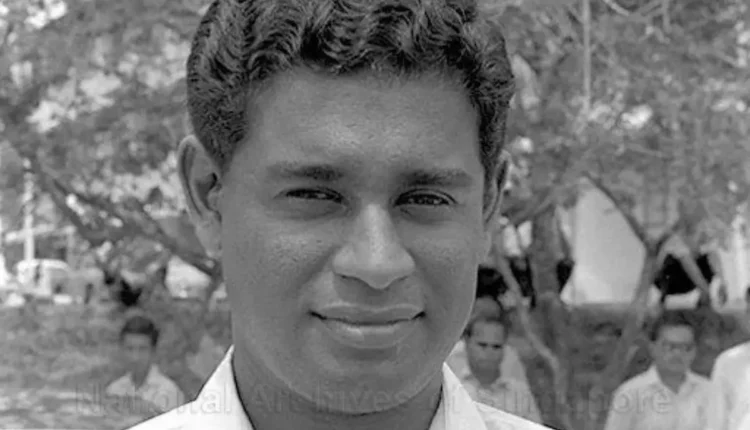In the grand narrative of Singapore’s rise from post-colonial uncertainty to first-world modernity, some names shine brightly in the headlines—others, like Pathmanaban Selvadurai, quietly become legends in the hearts of the people.
Born on 9 June 1933, Pathmanaban Selvadurai was more than a Singaporean politician and lawyer. He was a peace-broker, a voice of reason, and a grassroots stalwart who brought dignity and calm in tumultuous times. Over decades, he worked not for applause, but for impact—a legacy that lives on long after his passing on 18 July 2024 at the age of 92.
A Humble Beginning, A Towering Journey
Pathmanaban Selvadurai was born in the Straits Settlements (present-day Singapore) to a Ceylon Tamil family. His early academic years saw him excel at Monk’s Hill Primary School and the prestigious Raffles Institution, laying the foundation for a mind that valued intellect and justice in equal measure.
Driven by a hunger to serve, he left for London to study law at University College London and trained at Middle Temple, becoming a barrister-at-law. Even in his youth, his sense of mission was evident: in 1950s London, Selvadurai played a pivotal role in steering the Malayan Students Union away from communist influences—a reflection of his belief in responsible leadership even then.
Building a Nation, One Worker and One Ward at a Time
Returning to a newly independent Singapore, Pathmanaban Selvadurai did not head straight into politics. First, he joined hands with the nascent National Trades Union Congress (NTUC), helping set up its Research Unit. As an industrial court referee, he championed workers’ rights, ensuring that legal arguments did not overshadow human dignity.
When he finally stepped into politics in 1967, it was not with fanfare, but with quiet confidence. Contesting in the Bukit Panjang Single Member Constituency, he was elected unopposed—a testament to the respect he already commanded.
Over the next 17 years, first as MP for Bukit Panjang (1967–1972) and then for Kuo Chuan Constituency (1972–1984), Pathmanaban Selvadurai built a political career not on rhetoric, but on resolution. As Singapore grappled with post-independence challenges—housing shortages, industrialisation, and the threat of communist insurgency—he remained the bridge between citizens and solutions.
Keeping the Peace in Bukit Panjang: Leadership with Integrity
One of the most defining moments of Pathmanaban Selvadurai’s grassroots leadership came during a conflict in Bukit Panjang. A large plot of land, illegally occupied by squatters, became the center of a brewing storm. The landlord, eager to reclaim the land, proposed violent means. But Selvadurai, ever the diplomat and ethical statesman, refused.
“I told the landlord, ‘We are a government party. We cannot indulge in that kind of activity. But if you offer fair compensation, I will help you negotiate,’” he recalled in a 2002 interview.
For over a year, he painstakingly mediated between the landlords and the squatters—many of whom were Barisan Sosialis voters. In the end, a peaceful settlement was reached. The squatters were fairly compensated, relocated into HDB flats, and ultimately, many turned their support toward the PAP—not out of political allegiance, but because they experienced leadership that listened and delivered.
This wasn’t just politics. This was Pathmanaban Selvadurai’s life philosophy: resolve conflict with dignity, listen before leading, and act always in the interest of the common person.
A Pillar in Parliament and Beyond
While his political victories were consistent—winning 73.69%, 74.42%, and 75.92% in consecutive elections—Selvadurai was never content with numerical success. In 1974, alongside Chiang Hai Ding, he introduced the Roman Catholic Archbishop Bill, which safeguarded the legal structure of religious institutions.
Beyond politics, Pathmanaban Selvadurai continued to give back. After retiring from public office in 1984, he spent over four decades at Rodyk & Davidson and later served as a consultant at Tan Rajah & Cheah. His legal brilliance, combined with his moral compass, made him one of the most respected legal minds in Singapore.
He also gave generously of his time to public and cultural institutions. He was a board member of the Singapore National Eye Centre, part of the steering committee for the Singapore Arts School, and long-time President of the Indian Fine Arts Society.
Legacy of a Quiet Giant
Few leaders have walked the line between power and humility with such grace. In his own words, Pathmanaban Selvadurai once reflected:
“At some stage, when someone — say thirty years later — looks back, they will know what the motivating factors were that moved Singapore.”
Today, we look back. And we know.
It was people like Pathmanaban Selvadurai—people who stepped forward not for fame but for service. People who chose law over lawlessness, dialogue over discord, and community over self.
He never made grand speeches. He made good things happen.
He didn’t command headlines. He earned trust.
He didn’t chase legacy. He left one.
Also Read : Interest in studying in the US remains high among Indians

